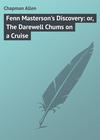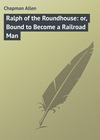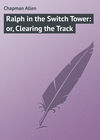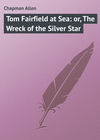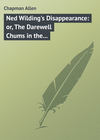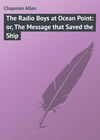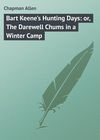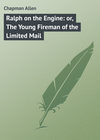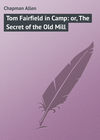Loe raamatut: «Fenn Masterson's Discovery: or, The Darewell Chums on a Cruise», lehekülg 5
CHAPTER XII
NED GETS A FISH
“Hark!” exclaimed Bart. “What’s that sound?”
“The pumps!” replied Fenn. “They’ve started ’em. It must be a bad leak. We’d better get life preservers.”
“Don’t get excited,” counseled Frank coolly. “Wait until you see how bad it is. These steamers are all built with water-tight compartments, and it would take quite a hole to make one of them sink. The starting of a few plates wouldn’t do it.”
His words calmed his chums, and, when Captain Wiggs came on deck, a few minutes later, he announced that the leak was not a serious one, though it would be necessary to go ashore to make repairs.
It was found, on docking the Modoc that the repairs would take about a week, and this period the boys spent in making excursions on shore, in the vicinity of the town. They had a good time, and the delay did not seem very long because of the many interesting sights.
They visited a large saw mill where the logs, that had been brought down the lake in big rafts, were cut up into lumber, and the foreman of the plant showed them the various processes through which the tree trunks went before they were turned out in the shape of boards, planks or timbers.
“Well, we’ll start in the morning, boys,” announced Captain Wiggs one night. “The Modoc is in good shape again, and we’ll have to make good time from now on, because of our delays.”
Early the next morning the vessel was under way again. Out on Lake Huron it steamed, plowing through the blue waters, under a sunny sky, while a gentle breeze stirred up little waves.
“Why don’t you boys do some fishing?” asked Captain Wiggs, as he noticed the four chums sitting near the after rail, talking among themselves.
“We didn’t know we could catch anything here,” replied Ned.
“I don’t either,” was the captain’s answer, “but you can’t tell until you try. There is plenty of tackle aboard, and you might land something nice. There are fish in the lake – plenty of ’em. The thing to do is to catch ’em.”
The boys needed no other invitation, and soon they had lines trailing over the stern of the ship, far enough away from the screw to avoid getting tangled in the blades. Mr. Ackerman, the sick passenger, who has improved considerably, also took a line, and joined the boys.
“Let’s see who gets the biggest fish,” proposed Ned.
“Let’s see who gets the first one,” supplemented Bart. “That’s the best test.”
It did not look as if luck was going to be very good, for the lines had been over half an hour, and no one had had so much as a nibble.
“This is getting tiresome,” spoke Ned, as he assumed a more comfortable position in his chair. Then he tied his line to his wrist, propped his feet up on the rail, and lounged back.
“Well, if that isn’t a lazy way of fishing!” exclaimed Frank. “Why don’t you sit up?”
“I will when I get a bite,” replied Ned.
They resumed their waiting, with that patience which is, or ought to be, part of every angler’s outfit. Suddenly Frank nudged Bart and pointed to Ned. The latter had fallen asleep in his chair.
“Let’s play a joke on him,” proposed Fenn in a whisper. “I’ll tie him fast in his chair.”
“No, let’s pull up his line and fasten an old shoe, or something like that to it,” proposed Frank. “He’ll think he has a big bite.”
They started to put this plan into operation, when, as they were about to pull up Ned’s line, they saw it suddenly straighten out.
“He’s got a bite!” exclaimed Fenn.
“Yes, and a whopper, too,” added Frank.
“Look at it!” cried Bart, as some big fish, at the stern of the boat, leaped out of the water and fell back with a splash.
Then the line about Ned’s wrist tightened. He felt the pull and awakened.
“I’ve got him!” he cried. “I’ve got the biggest one!”
The next moment he went sprawling from his chair, while his arm was straightened out in front of him, for the strong line, to which a big fish was attached, was fairly pulling him along.
“Look out! He’ll go overboard!” cried Mr. Ackerman.
Bart made one leap, and grabbed Ned around the waist. This saved the luckless youth from being pulled over the rail, but it did not release him from his predicament.
“Oh! Ouch!” cried Ned. “It’s pulling my arm off!”
Indeed this seemed likely to happen, for the line was very strong, and the lad had tied it securely about his wrist. It could not slip over his hand, and the fish on the other end was tugging away for dear life. Doubtless it would have been glad enough to escape, but it was fairly caught, for as they afterward found, it had swallowed Ned’s bait, hook and all.
“Let go!” yelled Ned to Bart, who was clinging to his waist.
“If I do you’ll go overboard!” replied Bart. He felt his chum slipping from his grasp. “Give me a hand here!” Bart called to Fenn and Frank.
They jumped to his aid, while Mr. Ackerman, in an excess of nervous fright, ran up and down the deck shouting:
“Captain! Captain Wiggs! Stop the ship! A shark has got hold of one of the boys!”
“What’s that? What’s the trouble?” asked the commander, hurrying up from the cabin.
“A shark has got Ned!” repeated the invalid.
“Shark? In Lake Huron?” replied the commander. “You’re crazy!”
“Guess it must be a whale, by the way it pulls,” said Bart.
“It’s one of the big lake fish!” exclaimed the captain. “They’re as strong as a pony. Wait, I’ll cut the line!”
“No, don’t!” begged Ned, who, now that his three chums had hold of him, was in no danger of going overboard, though the thin, but tough cord, was cutting deep into his wrist, where he had foolishly tied it.
“Here, lend a hand!” called Captain Wiggs to a sailor who was passing. The man grabbed the line with both hands and soon was able, with the help which Frank and Fenn gave him, to haul in the fish. It seemed as if they really had a shark on the end of the line, but, when the finny specimen was gotten on deck, it was seen that it was not as large as the boys had imagined.
“Who would have thought it was so strong?” asked Ned, rubbing his chafed wrist.
“The speed of the boat had something to do with it,” said the captain. “You were pulling on the fish broadside I guess, but it is a very strong species even at that. They’re not often caught on a hand line.”
“Are they good to eat?” asked Ned, wishing to derive some benefit from his experience.
“Some folks like ’em, but they’re a little too strong for me,” answered the captain. “However, I think the crew will be glad to get it?” and he looked questioningly at the sailor who had helped land the prize.
“Yes, sir,” replied the man, touching his cap. He took the fish to the galley, where the cook prepared it for the men’s dinner. The boys tasted it, but did not care for the flavor.
“Aren’t you going to fish any more?” asked the captain, as he saw Ned coiling up his line, after the fish had been taken away.
“That’s enough for one day,” was the boy’s reply. “The other fellows can, if they like. My wrist is too sore.”
“Lucky you didn’t tie the line to your toe,” said Frank.
“Why?”
“Because you’d probably be walking lame now, if you had. As it is you can’t sign any checks for a while, I s’pose.”
“Oh, you and your checks!” exclaimed Ned, in no mood to have fun poked at him.
“Moral! Don’t go to sleep while you’re fishing,” said Bart.
“Well, I did better than you fellows did. You didn’t get anything,” retorted the fisherman.
CHAPTER XIII
CAUGHT IN THE LOCK
Ned, at the suggestion of the captain, put some salve on his wrist, for the cord had cut through the flesh. Then he had Bart bandage it up. This done the boys resumed their seats near the after rail, and talked about Ned’s exciting catch.
“I hope you don’t try such a thing again,” remarked Mr. Ackerman, as he came back from his cabin. “It’s a little too much for my nerves.” He sank down in a deck chair, and the boys noticed that he was quite pale. He seemed unable to get his breath.
“Would you mind – would one of you mind, reaching in my pocket and getting a bottle of smelling salts that I carry,” he asked. “I think if I took a sniff I’d feel better.”
“I will,” volunteered Fenn, for Mr. Ackerman’s hands hung limply by his side, and he seemed incapable of helping himself.
“Is this it?” asked Fenn, as he reached in the upper right hand pocket of the invalid’s vest and pulled out a small bottle.
“No – no,” was the answer, half whispered. “That is my headache cure. I think it must be in the lower pocket.”
Fenn replaced the headache cure and explored the lower right-hand vest pocket.
“Is this it?” he inquired, drawing up a small box.
“No, no – my dear young friend – those are my liver pills. Try again. I think it must be on the other side.”
He still seemed too weak to raise his hands. Ned was about to call Captain Wiggs, but Fenn made another try.
“I have it!” he exclaimed, pulling out a shining metal tube.
“No – no,” said the invalid faintly, opening his eyes and looking at what Fenn held up. “That’s my asthma cure. Try the next pocket, please.”
“Say, he’ll kick the bucket if Fenn doesn’t find that medicine pretty soon,” whispered Frank. “Guess I’ll help him.”
Fenn began a search of the lower left-hand vest pocket. He brought up a bottle, containing a dark liquid. Wishing to make sure he had the right stuff, he smelled of it, before asking Mr. Ackerman to open his eyes and look at it.
“Is that it?” whispered Ned.
“Smells bad enough to be it,” was Fenn’s answer.
“No, no. You haven’t got it yet,” spoke the invalid, in peevish tones. “That is my heart remedy. I must kindly ask you to try again. I remember now, it’s in my right-hand coat pocket.”
Fenn replaced the heart cure and made one more attempt. This time he brought up a short, squatty, round bottle.
“That’s it!” exclaimed the invalid joyfully, “Now, please hold it to my nose. Not too close.”
However, he spoke too late, for Fenn had placed the open phial right under Mr. Ackerman’s nose. The invalid gave one sniff, and then jumped from the chair as if he was shot.
“Wow! Ouch! Help!” he cried. “That’s strong ammonia! I use it for hay fever. That’s the wrong medicine! Oh! The back of my neck is coming off!”
He held his handkerchief to his face, the tears coming from his eyes because of the strong stuff.
“I remember now!” he managed to gasp. “I left my smelling salts in my stateroom. But I can get them now. I’m better – much better!”
“I believe he is,” remarked Frank, when Mr. Ackerman had gone below. “Say, isn’t he the limit, with his different kind of medicines?”
“You shouldn’t make fun of him,” spoke Bart.
“Whew!” suddenly exclaimed the captain’s voice. “I guess my invalid passenger must have been around here,” and he breathed in the ammonia-laden air.
“He seems to be quite sick,” said Fenn.
“Sick?” repeated the commander. “Say, I wouldn’t want him to hear me, but he’s no more sick than I am. He’s only got a touch of hypochondriacism.”
“Will – will he die soon of it?” asked Fenn.
“Die? I wish I had his chance of living,” went on the captain. “I guess you don’t quite understand. Maybe that word was too much for you. A person who has hypochondriacism has a little stomach trouble, and the rest is only imaginary. That’s what Mr. Ackerman has. Every once in a while he takes a trip with me, for the sake of his health, he says, but I think it’s to get away from working. Say, did he ask you to reach in his pocket for some medicines for him?”
“Yes,” replied Fenn, “and I had quite a time finding it.”
“I should think you would. He’s a regular walking drug store. If he’d throw all his powders, pills and liquids away, and live out of doors, he’d be all right in a month. I’m not making fun of him, but I wish somebody would, some day. Maybe it would cure him.”
“He seemed pretty sick,” ventured Bart.
“But he was lively enough when he smelled that ammonia I gave him by mistake,” said Fenn.
“Ammonia?” questioned the commander, and the boys then told him what had happened. “Ha! Ho!” laughed Captain Wiggs. “That is the best joke yet! Ammonia! Oh my! I’ll bet he was lively! Why, I can smell it yet!”
The little experience seemed to do Mr. Ackerman good, and it was several days before he complained again. Then he was seemingly as badly off as ever, taking some sort of medicine almost every hour. But the boys understood him now, and did not waste so much sympathy on him.
The Modoc steamed on, covering many miles over Lake Huron until, towards evening one afternoon, Captain Wiggs announced that morning would find them at the entrance of St. Mary’s river, the connecting link between Lakes Huron and Superior.
“Can you boys stand a little jarring?” he asked, as they were in the main cabin, after supper.
“Jarring? Why?” inquired Frank.
“Because we’ve got to jump the ship over St. Mary’s falls, and we don’t always make it the first time,” was the answer, given with much gravity. “Often we miss and fall back, and it jars the ship up quite a bit.”
“Oh, are we going through the ‘Soo’ canal?” asked Fenn eagerly, for he had been reading up about the Great Lakes, just before coming on the trip.
“That’s the only way of getting around the falls,” replied the captain. “I see you don’t put much faith in my jumping story.”
“We have to go through a lock, don’t we?” Bart wanted to know.
“Yes,” said Captain Wiggs, spreading a map out on the table, “we go through the canal, and lock, being raised up several feet, to the level of Lake Superior. If all goes well we’ll be through the lock by noon to-morrow.”
“Why do they call it the ‘Soo’ canal?” asked Ned.
“Because it is named after the falls,” was the commander’s reply. “The falls are called Sault Saint Marie, and that word which is spelled ‘S-a-u-l-t’ is pronounced as if it were spelled ‘S-o-o.’ It is a French word, and means a leap, or water-fall. So you see when you say ‘Sault (Soo) Saint Marie’ you are really saying ‘St. Mary’s Waterfall.’ The canal, and the city located along it, both take the name of the falls.”
The boys were up early the next morning to catch the first glimpse of the canal, lock and falls. It was some time before they reached them, however, and, when they did arrive at the canal, they found several vessels ahead of them, and had to wait their turn for entering the lock.
They had a fine view of the surrounding country and the falls of St. Mary’s, spanned by a big railroad bridge. When they approached the lock, they saw that the canal was there divided by two walls of masonry making two locks and enclosing a space that was laid out like a little park, with grass plots and trees. Along the edges of the retaining walls, which were very wide, many persons were walking.
At last it was the turn of the Modoc to enter the lock. She steamed slowly ahead, and an empty grain barge was also sent in at the same time, the lock being large enough for two vessels.
When the craft were in, the immense gates were closed behind them. The Modoc and the grain barge were now shut up in something like a box of masonry, with water for a bottom, and the sky for a top. The boys watched the men open the water-gates that let in a flood of liquid that swept in from Lake Superior, through the long canal.
Slowly the two vessels began to rise. The water boiled and bubbled, churning into foam as it forced its way in. It seemed as though it was protesting at being made to hoist the ships, instead of being allowed to course on to the mighty ocean.
Up and up went the great craft, being lifted as easily by the powerful water, as though some giant hand had reached down from the sky and was elevating them. A few feet more and they would be able to steam out on the upper lever of the canal, and thence into Lake Superior.
Suddenly a rope, that held the grain barge from drifting too close to the forward gates, parted. The churning of the water sent the clumsy craft ahead, and, in a moment the bow was caught under one of the heavy beams of the gate. As the water was still lifting, the nose of the craft became depressed, while the stern rose. Then the barge swung over against the Modoc, and a projection on it caught against the latter craft.
The barge was now held down, bow and stern, while, from beneath, it was being lifted by an irresistible force of water. The barge careened to one side, and the Modoc began to heel over.
“Shut off the water!” cried Captain Wiggs, who saw the danger. “Shut her off, quick, or we’ll be stove in!”
CHAPTER XIV
MYSTERIOUS STRANGERS
Under the forward gates, and through openings in them, the water was still bubbling and foaming, seeking to establish a level with that on the other side of the barrier. Lower and lower sank the bow of the barge, for it was held fast on the beam. The Modoc heeled over more and more.
“Shut off the water!” again cried the captain.
Then the attendants at the lock were made aware that something was wrong. Orders were shouted; men ran to and fro. With immense levers they shut the flood gates, and, slowly and sullenly, as though cheated of its prey, the bubbling subsided.
“We must pull the barge back!” cried one of the lock men, running up along the cement wall.
“No, don’t do that,” advised Captain Wiggs, as he stood on the bridge of his vessel, while the boys, who were much alarmed by the impending accident, had joined him, for they were permitted the run of the ship.
“Why not?” asked the man. “We’ve got to free her from that gate beam.”
“Yes, but if you pull her out from under the edge of that beam suddenly, she’s sure to bound up, and then she’ll come slap-bang against the side of my craft. Besides, I think she’s held so tight that you can’t pull her back.”
“What shall we do?” asked the man, recognizing that Captain Wiggs knew what he was about.
“Let the water out from the rear gate,” was his suggestion. “That will lower my vessel and the barge gradually. They’ll assume their right positions, and no damage will be done. Then you can raise us again, and be sure no more ropes break. I don’t want an accident like that again.”
The captain’s advice was followed. When the water ceased coming in the forward gate, the men ran to the rear one and opened the valves there. Out rushed the imprisoned fluid, boiling and bubbling at a great rate. Slowly the two big vessels began to sink. The barge swung away from the Modoc and then, a little later, when the water had fallen sufficiently, the bow was released from the projecting beam. The two crafts were now in the same positions they had been in when they first entered the lock.
Men hastily fastened heavier ropes to the barge, and took several turns about strong bitts, so the ship could not again drift into danger. Then the flood was once more allowed to enter the lock.
Again the vessels rose, and this time, without mishap, they were floated to the higher level of the canal. The forward gates were opened and out toward Lake Superior steamed the Modoc, followed by the slower grain barge. The boys looked around them, being able to get a better view now, as they were some distance higher, being on a level with the top of the falls, off to their right. They saw a long string of vessels, some waiting to enter the locks to proceed east, while others were coming west.
“That was a narrow escape,” remarked Bart, when the ship was again proceeding along.
“Yes, we seem to be sort of up against lots of hard luck this trip,” remarked the captain. “I think you boys must be responsible.”
“How?” asked Fenn, for the captain looked serious.
“Why, you’re regular Jonahs. If there were any whales in these waters I’d try the experiment of throwing one of you overboard, to see if I couldn’t change my luck.”
“I’d be willing to jump over and take a swim,” volunteer Ned. “It looks nice and cool in there, and it’s hot up here.”
It was a warm July day, and the weather was humid and unpleasant.
“Maybe when we get further out on Lake Superior, and come to some good place to tie up, I’ll give you a chance to take a dip,” responded the commander. “I’d like one myself.”
“Ned must take care not to go to sleep, or he’ll be carried under by a big fish,” suggested Fenn, taking precautions to get beyond the reach of his chum’s arm.
The Modoc touched at a port of call that afternoon, and Captain Wiggs found awaiting him a message which changed matters so that he did not have to be in any hurry to conclude his voyage.
“This will give us a chance to lay-to, and go ashore,” he said to the boys. “You might as well have a good time while you are on this cruise. No telling when you’ll get another.”
It was a day after this, one of the hottest that the boys ever remembered, that the Modoc came to anchor off shore, near a little bay, on the edge of which, and about three miles away from where they laid-to, was a good-sized town.
“Now for a swim!” exclaimed Ned. “Can we take the boat and go ashore, captain?”
The desired permission being given, the four chums were soon rowing toward where they saw a sandy beach, that seemed to be put there on purpose for bathing. They hauled the boat up on shore and soon were disporting themselves in the water.
“Oh, this is something like!” exclaimed Fenn, as he proceeded to float with nothing but his face out of the water.
“Yes, you look just like a baby crocodile,” replied Frank.
“I do, eh?” asked Fenn, diving suddenly and coming up under Frank, whom he ducked unceremoniously.
“Here! Quit-erurgle-gurgle!” called the luckless one, as he sank out of sight.
Then the boys began to play tricks on each other, had impromptu races and diving contests, and enjoyed themselves to the limit in the cool water.
“Let’s dress and go on a little exploring trip,” proposed Fenn, after they had spent an hour in the lake. “We’ve got time enough before we have to go aboard.”
His suggestion was well received, and soon the four chums were strolling back from the lake, through the dense woods that bordered it. They had not gone far before Frank, who was in advance, suddenly halted. He motioned to the others to approach silently, and they joined him on tip-toe.
“What is it?” asked Ned.
Frank pointed through the bushes. Beyond the screen of the underbrush the boys could see a road. It did not seem to be much traveled, but what attracted their attention was a big automobile, drawn back, and almost hidden in the thicket.
“The machine’s been abandoned,” was Bart’s opinion. “It is probably broken.”
“Hush!” cautioned Frank, and not a moment too soon, for, at that instant two men stepped cautiously out of the bushes near the auto. One of them produced a telescope, and pointed it at the lake, which was just visible through the trees.
The boys looked at the man. He seemed a rough sort of fellow, with an unpleasant face. He was poorly dressed, and the lads noticed that, standing against a tree near him, was a rifle.
But it was a sight of the man’s companion which caused the boys to stare again and wonder. For the second man was a Chinese, though he wore American clothes. Under his hat, however, could be seen the tell-tale queue.
The white man handed his Celestial companion the telescope, and murmured something to him, evidently in Chinese. The other replied and applied the glass to his eye. No sooner had he done so that he uttered an exclamation, and began jumping about.
The other man snatched the glass and took a look. Then they both talked very excitedly, pointing to the lake and then at the auto.
“I wonder what they can be up to?” whispered Fenn.
At that moment he stepped on a loose branch. It broke with a sharp report, and the Chinaman and the white man glanced to where the boys were hidden.
“Come on!” exclaimed Frank. “They may come after us!”
